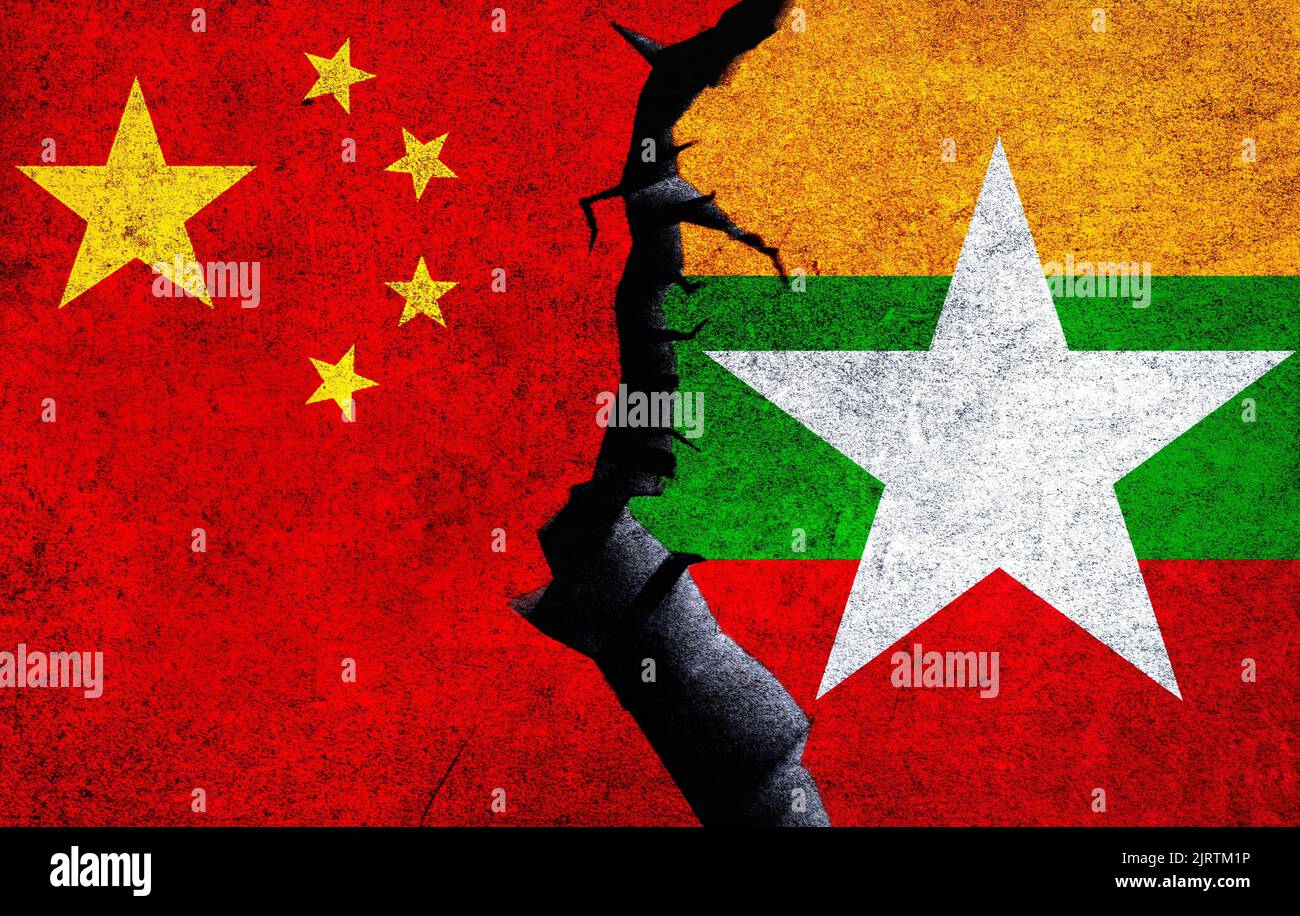Double Standards? Examining Britain And Australia's Approach To The Myanmar Crisis

Table of Contents
The situation in Myanmar remains dire following the February 2021 military coup, which ousted the democratically elected government of Aung San Suu Kyi. The ensuing violence, human rights abuses, and displacement have created a profound humanitarian crisis, displacing millions and causing widespread suffering. This analysis will explore the extent to which Britain and Australia have employed tools such as humanitarian intervention, sanctions, and diplomatic pressure to address this crisis.
Britain's Response to the Myanmar Crisis
Sanctions and Diplomatic Pressure
The UK has implemented a range of sanctions against Myanmar's military junta in response to the escalating crisis. These actions are designed to exert economic and political pressure, aiming to encourage a return to democracy and accountability for human rights violations.
- Targeted Sanctions: The UK has imposed asset freezes and travel bans on numerous key individuals within the military regime, including members of the State Administrative Council (SAC) and those responsible for atrocities against the Rohingya and other ethnic minorities.
- UN Security Council Engagement: Britain has actively participated in UN Security Council discussions on Myanmar, advocating for stronger measures and pushing for resolutions to address the crisis. They have consistently condemned the violence and called for the release of political prisoners.
- Public Statements: British officials have repeatedly issued strong statements condemning the coup and human rights abuses, calling for an end to the violence and a return to democratic governance.
These actions, while significant, fall short of comprehensive sanctions such as an oil embargo, which some argue are necessary to truly impact the junta's finances and power. The effectiveness of these UK sanctions on Myanmar and their overall impact on the situation remain a topic of ongoing debate.
Humanitarian Aid and Support for Refugees
Alongside its sanctions regime, Britain has committed considerable resources to humanitarian aid efforts in Myanmar and for the burgeoning refugee crisis in neighboring countries.
- Funding for NGOs: The UK government provides significant funding to international organizations like the UNHCR, UNICEF, and various NGOs working on the ground in Myanmar and neighboring countries, providing essential aid to those most affected.
- Refugee Support: Britain has offered resettlement programs for some refugees fleeing the violence in Myanmar, demonstrating a commitment to protecting those displaced by the crisis.
- Financial Contributions: The exact figures fluctuate, but the UK has committed millions of pounds in humanitarian assistance, contributing substantially to international relief efforts. This commitment needs to be considered alongside the total scope of the crisis.
Australia's Response to the Myanmar Crisis
Sanctions and Engagement with ASEAN
Australia's approach to the Myanmar crisis reflects a blend of targeted sanctions and engagement with regional organizations. While similar to the UK’s in some respects, there are key differences.
- Targeted Sanctions: Australia has also implemented targeted sanctions, imposing travel bans and asset freezes on select members of the Myanmar military regime. However, the scope of these sanctions might be comparatively narrower than those imposed by Britain.
- ASEAN Engagement: Australia has placed significant emphasis on working with ASEAN (Association of Southeast Asian Nations) to find a peaceful solution to the crisis. This reflects a strategic focus on regional cooperation and stability. This approach contrasts with Britain's more direct, unilateral action.
- Differing Priorities: The differences between the UK and Australian approaches are partly due to their varying strategic priorities in the region. Australia’s engagement with ASEAN could be seen as a recognition of the limitations of unilateral sanctions and the importance of regional consensus.
Humanitarian Assistance and Support for Regional Stability
Australia has also provided substantial humanitarian aid, focusing not only on immediate relief efforts but also on supporting regional stability in response to the Myanmar Crisis.
- Aid to Neighbouring Countries: Australia has channeled much of its aid to neighboring countries hosting Myanmar refugees, contributing to the support of these overburdened states. This reflects a recognition that the crisis extends beyond Myanmar's borders.
- Regional Security Focus: Australia's aid strategy reflects a considerable emphasis on bolstering regional security and preventing further instability caused by the spillover effects of the Myanmar crisis. This contrasts with the UK's more direct focus on humanitarian needs within Myanmar itself.
- Development Initiatives: Alongside emergency aid, Australia invests in long-term development projects in the region, seeking to build resilience and stability in the face of ongoing challenges.
Comparing and Contrasting Approaches: Evidence of Double Standards?
Analysis of Policy Differences
A comparison of the British and Australian responses to the Myanmar crisis reveals both similarities and significant differences. Both countries have implemented targeted sanctions and provided humanitarian aid, yet the specifics of their approaches diverge considerably. Australia's stronger emphasis on ASEAN engagement and regional stability contrasts with Britain's more direct, and arguably more forceful, unilateral approach through targeted sanctions and UN engagement.
- Sanctions Scope: The scope and intensity of sanctions vary, with the UK potentially taking a more assertive stance than Australia.
- Regional Cooperation: Australia's engagement with ASEAN demonstrates a preference for multilateral action, whereas the UK has employed a more assertive, independent strategy at the UN.
- Aid Allocation: While both nations provide humanitarian aid, the distribution and strategic focus of that aid may differ, reflecting their unique national interests and regional priorities.
The differences in response may not constitute a clear-cut case of "double standards," but they do highlight the nuanced and often self-interested nature of international responses to complex crises.
Exploring Potential Explanations for Differences
Several factors might explain the divergent approaches.
- Geopolitical Considerations: Australia's proximity to Myanmar and its focus on regional stability influences its approach. The UK, geographically distant, may feel less constrained by immediate regional dynamics.
- National Interests: Both countries have different economic and strategic interests in the region, which influence their policy choices. Australia’s emphasis on ASEAN reflects its broader regional engagement strategy.
- Public Opinion: Domestic public opinion and political priorities in both countries may also play a role in shaping their respective responses.
These varying factors must be considered when evaluating the effectiveness and ethical consistency of both countries' responses.
Conclusion
The comparison of Britain and Australia's responses to the Myanmar crisis reveals a complex interplay of factors shaping national policies. While both countries have condemned the military coup and provided humanitarian aid, their approaches to sanctions and diplomatic engagement differ significantly. Whether these differences constitute double standards is debatable, but they highlight the multifaceted nature of international responses to complex humanitarian and geopolitical challenges. Understanding these differences requires careful consideration of geopolitical realities, national interests, and the limitations of international cooperation. Addressing the Myanmar crisis effectively requires a sustained and coordinated international effort, going beyond targeted sanctions to encompass meaningful diplomatic pressure and robust humanitarian support. Continued research into the Myanmar Crisis and advocating for stronger, more consistent, international action are crucial to solving the Myanmar crisis and ensuring accountability for human rights abuses.

Featured Posts
-
 Pregnant Cassie And Husband Alex Fine Shine At Mob Land Premiere Photos
May 13, 2025
Pregnant Cassie And Husband Alex Fine Shine At Mob Land Premiere Photos
May 13, 2025 -
 Eva Longorias Unrecognizable Hair Makeover Fans React
May 13, 2025
Eva Longorias Unrecognizable Hair Makeover Fans React
May 13, 2025 -
 Market Rally S And P 500 Up Over 3 Following Trade Deal Progress
May 13, 2025
Market Rally S And P 500 Up Over 3 Following Trade Deal Progress
May 13, 2025 -
 Revolutionizing Voice Assistant Creation Open Ais Latest Advancements
May 13, 2025
Revolutionizing Voice Assistant Creation Open Ais Latest Advancements
May 13, 2025 -
 Dy Kapryw W Brwdy Dr Prwzhh Zndgy Namh Ay Aywl Knywl
May 13, 2025
Dy Kapryw W Brwdy Dr Prwzhh Zndgy Namh Ay Aywl Knywl
May 13, 2025
